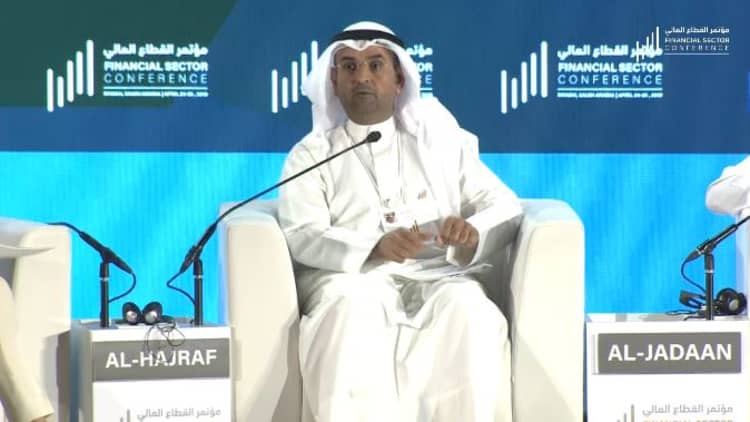
BlackRock's billionaire chief executive isn't too worried about the oil price despite a recent spike brought on by Iran sanctions news.
Citing robust crude inventories beyond hotspots like Venezuela and Iran, where civil conflict and U.S. sanctions have taken millions of barrels of oil off the market, Larry Fink espoused an optimistic approach to markets and the Gulf region in the medium and long term.
"Related to the sanctions on Iran ... the delta is much smaller than people think," Fink told CNBC's Hadley Gamble during a panel at the inaugural Financial Sector Conference in Riyadh Wednesday.
The asset manager was likely referencing the now four-year low in the Islamic Republic's crude exports, hit by U.S. sanctions as a result of the President Donald Trump administration's withdrawal from the 2015 Iran nuclear deal in May last year.
Iranian exports dropped to 1.4 million barrels per day (bpd) in March, according to the Energy Information Administration, down from 2.8 million bpd in May of the previous year. The figure represents just over half of the country's current total production, which OPEC reports sat at 2.6 million bpd in March, down from 3.6 million bpd in the third quarter of last year.
The State Department announced on Monday its intention to deny further sanctions waivers to countries that import Iranian crude, immediately sending the oil price up about 3%. In response, Iranian officials threatened to close the Strait of Hormuz, the conduit route for about 20% of all seaborne trade in crude and condensates.
But Fink, as well as Saudi Energy Minister Khalid al Falih, pointed to a rise in inventories in the Arab Gulf states as well as in the U.S. that they believe will offset the tightening supply from Iran.
"As the (Saudi) oil minister suggested, there is greater inventory, so if there's a time to be moving forward and make the region even more secure, it looks like this is probably a very good time to do that," Fink said.
Al Falih, speaking to a panel audience at the same event, made assurances that OPEC members would "not leave customers scrambling" if significant oil supplies came off the market.
Saudi Arabia "will be relied upon to work with other producers to keep markets adequately supplied. Indeed, rumors are rife that OPEC's core Arab members are readying themselves to raise output," PVM Oil Associates analyst Stephen Brennock said in a research note Wednesday. "As such, Trump's doubling down on his anti-Iran strategy may have a muted impact on global oil balances."
The deficit in Iranian crude may also be countered by U.S. oil inventories, which are expected to grow by 1.6 million bpd this year, according to the International Energy Agency.
Still, the near term outlook is bullish for prices, Brennock said, "because OPEC data suggest that with the organization producing just over 30 million bpd, the current quarter should see global oil stocks fall by 760,000 bpd and (in the third quarter) by 930,000 bpd."
Other forecasters like Barclays see a substantial upside price risk due to the revoking of sanctions waivers, which had previously been given to eight countries that together constituted more than 75% of global imports of Iranian oil.
"While Saudi Arabia, UAE and other OPEC countries will likely fill the gap created by lower Iranian exports ... it will come at the cost of a significant reduction in the spare capacity and also increase the risks of a potential conflict in the Middle East," Barclays said in a daily note Wednesday.
"All else equal, if Iranian exports are reduced to zero, it would imply at least a $5/barrel upside to our current $70/barrel average price forecast for Brent this year."



